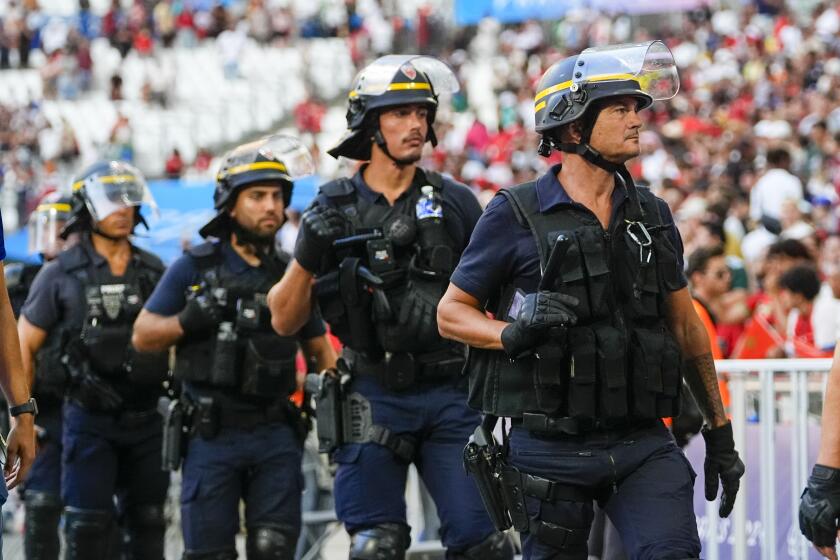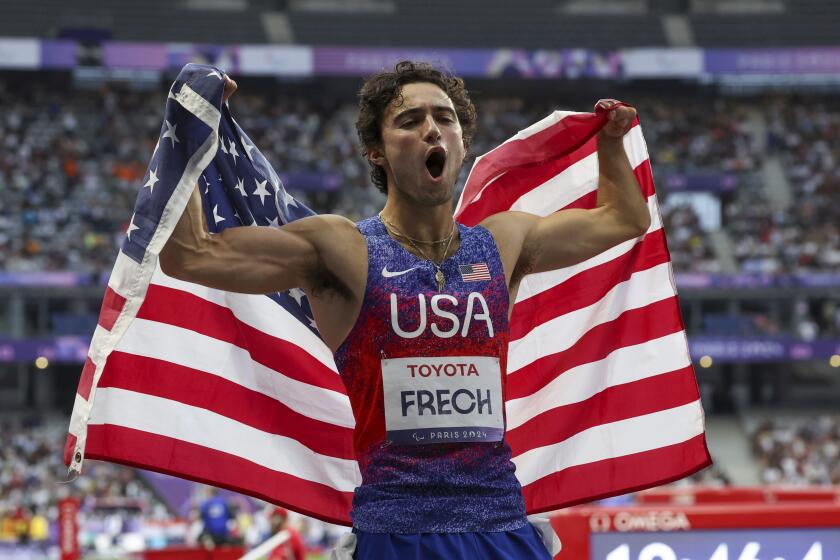Made in America <i> by Peter Ueberroth, with Rich Levin and Amy Quinn (Morrow: $17.95; 401 pp.) </i>
For those who were touched by the joy of the 1984 Olympics in Los Angeles, reading a book about the man who was most responsible for creating that joy should evoke similar emotion. Yes, should.
Peter Ueberroth, the self-made man, a Lee Iacocca West, went from a one-vote election margin that made him president of the newborn Los Angeles Olympic Organizing Committee in 1979 to Time Magazine Man of the Year in 1984. In those five short years, he went from being a household word in his own household to a household word in just about everybody’s. So, along came the inevitable “How I Done It” story.
There’s a hitch in this one, however. Ueberroth teases us about how he did it. He doesn’t really tell us. Or, if he does, it zips past quickly and is lost again somewhere in a maze of name-dropping (“We dropped in for lunch at Chow’s” or “We had our meeting in a conference room at Chateau de Vidy”) or flag-waving (“I’m an unabashed patriot . . .”).
This is not a bad book, especially for those who felt the pride of civic and nationalistic achievement for those 16 days of athletic brotherhood in July and August of 1984 and desire to relive the moments. And the writers, Rich Levin and Amy Quinn, move the story along quickly, getting the reader through very complex times with minimal headaches. There was probably enough going on around the Los Angeles Olympic Organizing Committee headquarters just the last year or so before the Games to make this book read like “War and Peace.” That they didn’t do.
But, perhaps, in their desire to keep it short and simple, they overcompensated and gave us “Sesame Street.”
The reader gets a light salad. No meat and potatoes. Those who had no opinion about Ueberroth and want help in that regard by reading the book will still have none. Or will, at best, have the picture of a relatively young, hard-nosed businessman who somehow weathered a five-year storm of endless details, endless politics, endless red-eye plane flights and endless problems to put on the best two-week track meet ever.
Hard to dislike a guy like that, eh? Well, maybe that’s the point. Call it the vanilla approach to image building. Or the tread-softly approach to book writing.
Ueberroth holds a match under a few bridges, but burns none. He takes jabs, but never roundhouse swings, at the likes of Police Chief Daryl Gates; the Reagan Administration and its State Department; International Olympic Committee Executive Director Monique Berlioux; local politicians Ira Reiner and Bill Robertson, and the Los Angeles Times, for not jumping on the torch-relay bandwagon as soon as he would have liked.
But even those jabs connect softly, and all of the aforementioned criticized including top corporate officials of The Times, are listed at the end of the book in a section dedicated to giving credit to the Games’ “Superstars.”
The story is all too mechanical, making one wonder if the man telling it is, too. There are too many robot marches through problems, too little agony and ecstasy en route to solutions. What Peter Ueberroth went through to put on the ’84 Olympics must have been gut-wrenching. What he tells us he went through is only eyebrow-raising. Even his attempts to introduce family charm falls short. His wife, Ginny, sounds like Saint Virginia, and very well may be. His children come off like a modern-day version of the Von Trapp family, skipping along through the hills of daily pressures to the sounds of Olympic music.
High on the list of shocking revelations was Ueberroth’s description of slamming his chair down in anger over a dispute with the International Olympic Committee’s Berlioux and breaking the two back legs. “Bill the chair to the IOC,” he tells an associate.
One can just imagine Clint Eastwood, reading the book and shuddering.
More to Read
Go beyond the scoreboard
Get the latest on L.A.'s teams in the daily Sports Report newsletter.
You may occasionally receive promotional content from the Los Angeles Times.






